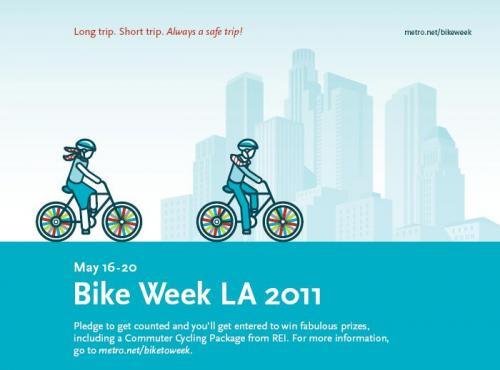Los Angeles Bike Week Is Approaching: Get Your Boss to Pay to Fix Up Your 10-Speed

Next week is "Bike Week" here in Los Angeles and the city is celebrating by hosting a bunch of rides and events across town. Perhaps coolest of all, Metro and several other transit agencies in LA county are offering free rides to bikers next Thursday, May 19th.
Feeling left out because your 10-speed has been rusting away in the garage for the past 10 years? Not to worry, you have plenty of options. But perhaps the best one is to use the benefits of the Bicycle Commuter Act to get your boss to pay for your bike fix.
The Bicycle Commuter Act is one of the best kept secrets in the tax code. It passed back in 2008, buried in the back of the first financial bailout. It went into law in 2009, and allows employers to reimburse employees for bicycle-related expenses to the tune of $20 a month. Your boss gets a write-off and you get the new brakes you needed.
I spoke with Meghan Cahill of the League of American Bicyclists, who filled me in on the criteria for the program. Commuters have to use a bicycle four our of five days per week to be eligible. However, the program can taken advantage of on a month-per-month basis. So if you are really into biking in May during Bike Week, but don't want to bike to work during September, when it's ungodly hot, you don't have to.
To take advantage of the bike subsidy, your employer has to be a member of the program. The easiest way for this to happen is to get your boss to buy vouchers through the website Commuter Check, which can then be given out to employees and used at participating bike shops. Your employer would then get a pretax refund.
Metro has more on the specifics if you're still confused. And here's the IRS's page on the Bicycle Act if your boss doesn't believe you.
Like the idea of having your bike expenses subsidized? Well, tell your congressman, because there's a new bill currently making its way through the House that would expand the program called The Commuter Relief Act. According to the League of American Bicyclists, this new act will:
* Increase the amount of the bike commuter benefit from $20 to $40 a month.
* Allow bike commuters to combine the bike commuter benefit with other fringe benefits -- up to $200. For example, You could use the $40 bike benefit and collect up to $160 of your public transit benefit.
* Cap all transportation fringe benefits at $200 a month (the parking benefit is currently $230, the transit cap will drop to $130 at the end of 2011).
* Allow self-employed people to receive transit fringe benefits for work-related commuting.
* Require employers offering a parking transportation fringe benefit to also offer employees the option to take cash instead. This would create an incentive for more people to leave the car at home and take cheaper options, like transit, biking, and walking.
* Create a 10 percent tax credit for vanpool expenditures
Sounds worthy of support. As it stands currently, you can't use the benefits of the Bicycle Commuter Act and get subsidized Metro travel at the same time: even though your commute might necessitate both means of transportation.

The L.A. Vitamin Report is a column about quality of life issues by Matthew Fleisher. It is brought to KCET's SoCal Focus blog in partnership with Spot.Us, which receives support from the Cailfornia Endowment.


